
Knowing how consumers behave is crucial for creating effective marketing strategies in today’s fast-changing digital world. This is where consumer intelligence is helpful. Data analytics allows businesses to collect valuable insights about customer preferences, feelings, and trends. This approach to data use helps marketers improve their campaigns, personalize customers’ experiences, and gain a competitive advantage.
5 Essential Consumer Intelligence Tools for Elevating Your Marketing Strategy

The key to finding the correct information about consumers is using the right tools. There are many choices, and picking the ones that work for you can be challenging.
To help you, we will look at five popular tools that many businesses trust. These tools provide detailed customer data and practical intelligence. They use advanced technologies, like social media listening, predictive analytics, and artificial intelligence, to give a clear picture of your audience.
1. Brandwatch
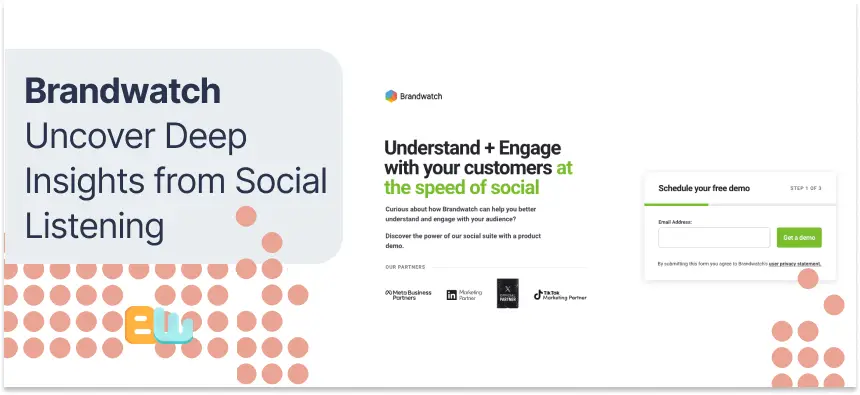
Brandwatch is a powerful tool for social listening and customer insights. It helps brands analyze online conversations and find important information. With its advanced data visualization tools, Brandwatch shows complicated data in a simple way, making it easier for brands to make smart choices.
One of its best features is tracking brand mentions, hashtags, and industry keywords on many social media sites, news sites, forums, and blogs. This complete view helps businesses see how customers feel. They can understand public opinion, watch competitors, and spot new trends.
Brandwatch also has innovative sentiment analysis features. It does more than find positive or negative comments. It looks at feelings, urgency, and goals behind what people say online. This deep understanding helps brands change their messages, deal with customer problems early, and spot possible brand issues before they become big problems.
2. Talkwalker
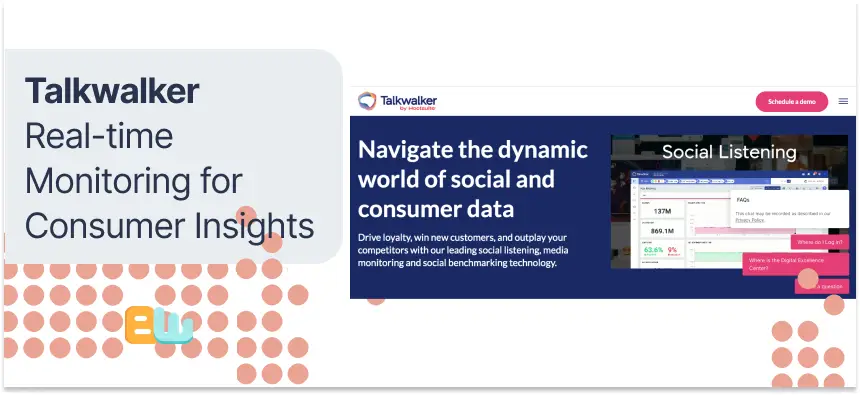
Talkwalker helps businesses monitor and analyze online conversations in real time, helping them stay ahead. It gathers data from many sources, such as social media, news sites, forums, and blogs. This gives Talkwalker a complete look at brand mentions, customer feelings, and new trends.
The platform uses predictive analytics to spot possible problems early. This helps businesses respond quickly and manage their reputation. By acting before issues arise, brands can lower risks and maintain a good image.
Besides monitoring, Talkwalker also offers detailed reports and competitive intelligence tools. Businesses can see their share of voice, compare their performance to competitors, and find chances to work with influencers.
3. Mention
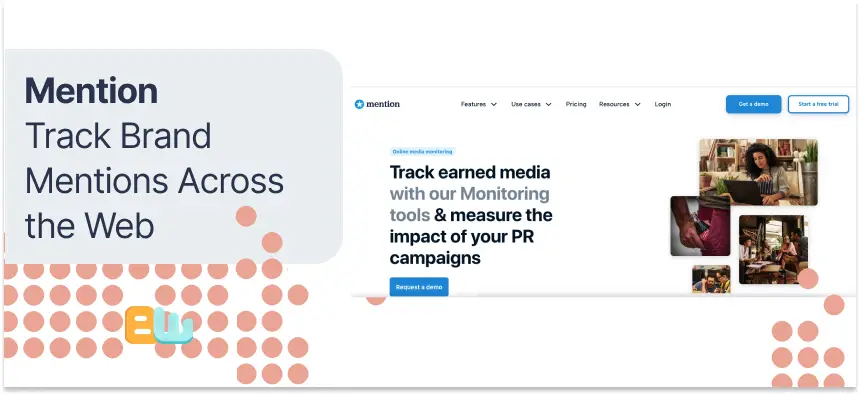
Mention is a powerful tool for media monitoring. It helps brands easily track their brand mentions and online chats. Mention keeps businesses updated on what people say about them online by sending real-time alerts for keywords, hashtags, and competitor mentions. This quick monitoring is essential for managing brand reputation, checking how campaigns are doing, and spotting potential PR issues before they get worse.
Besides just tracking brand mentions, Mention gives valuable information about customer sentiment. By looking at the tone and context of online talks, businesses can see how the public feels and understand how their brand, products, or services are viewed.
Also, Mention helps improve social media engagement. It lets businesses directly answer comments, messages, and mentions from the platform, making social media management easier. It’s great for handling customer questions, solving issues quickly, and building good relationships with their audience.
4. Sprout Social
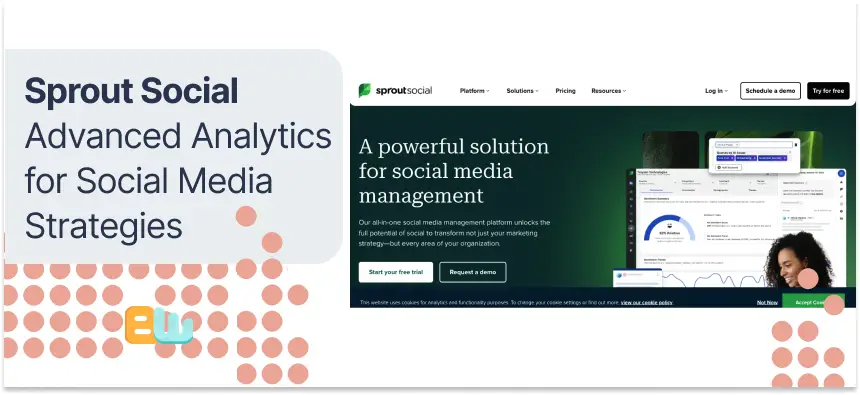
Sprout Social is a robust platform for managing social media. It does more than just schedule and publish content. With its advanced analytics, Sprout Social helps businesses see how well their social media efforts work.
It looks at social media data about reach, engagement, and audience makeup. This gives actionable insights to improve content strategies, find the best times to post and understand how audiences behave. This way, your customer engagement strategies match what your target audience likes the most.
Sprout Social also excels at social listening and competitive analysis. Its detailed reporting dashboard shows brand mentions, competitors’ actions, and the latest industry trends. This helps businesses make smart choices for their social media plans. By spotting influencers and tracking important conversations, businesses can use social media more effectively to boost brand visibility and create real connections.
5. HubSpot
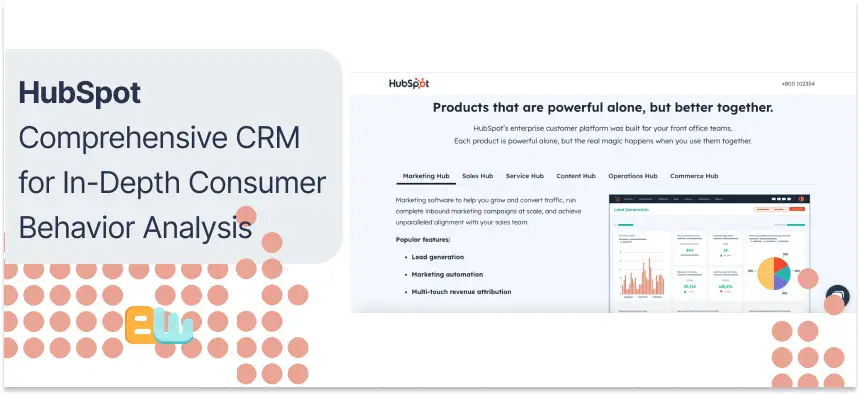
While people know HubSpot primarily for its marketing automation, it is also a complete CRM platform. It has solid tools for understanding consumer behavior. HubSpot can combine data from different points in the customer journey, giving you a full view of how each customer interacts with your brand.
HubSpot tracks website visits, email responses, social media posts, and sales actions. This makes it easy to create detailed customer profiles. You can sort your audience based on their behavior and preferences. This deep understanding helps you offer personalized content and special deals that fit their needs and interests.
HubSpot has reporting and analytics dashboards. They provide valuable insights into where customers are in their journey. You can also see conversion funnels and how well your campaigns do. By studying this data, you can improve your marketing and sales tactics. This helps you get more customers, keep them engaged, and guide them to stay loyal.
Understanding the Power of Consumer Intelligence Tools

Using consumer intelligence tools can significantly help a business succeed in our data-focused world. These tools let you see more than just primary data. They help you understand what drives consumer choices, what they like, and what problems they face.
When businesses use these intelligence tools right, they can change their marketing strategies. Instead of general campaigns, they can create personalized experiences that connect with their audience. This leads to higher conversion rates, better customer satisfaction, and a more substantial brand reputation.
How These Tools Drive Strategic Marketing Decisions
The rich information from marketing intelligence helps businesses make smart choices that match the needs and likes of their target audience. Instead of guessing, marketers can use data-driven insights. This helps them improve their campaigns, tailor customer experiences, and get a better return on their investment.
These tools help with marketing decisions by revealing customer sentiment. By studying online discussions, brand mentions, and customer feedback, businesses can see what they are doing well and what needs work.
The Role of AI and Machine Learning in Enhancing Data Accuracy
Artificial Intelligence (AI) and machine learning are critical factors for improving the accuracy and efficiency of data analysis in consumer intelligence tools. These technologies help tools to handle large amounts of data from many sources. They find patterns and create insights that would be hard for people to identify independently.
One way AI improves data accuracy is through sentiment analysis. By training algorithms on large human language and feelings collections, consumer intelligence tools can easily and accurately determine the sentiment in online chats, reviews, and social media posts.
Integrating Consumer Intelligence into Your Marketing Plan

Using consumer intelligence in your marketing plan is very important. It helps you get a better return on your marketing investment and build a strong brand. When you learn about your target audience’s needs, likes, and troubles, you can create marketing campaigns that better connect with them.
This focus on the customer leads to better marketing efforts and higher conversion rates. It also helps build customer loyalty. Consumer intelligence can help you manage your marketing budget more wisely, focusing on the best strategies.
Aligning Tool Capabilities with Business Objectives
Choosing the right tool for understanding customers and ensuring it matches your specific business goals is very important. You should clearly define what you want to achieve to get the most from business intelligence. Then, determine which tools can give you the insights needed to reach those goals.
If your main aim is to boost customer satisfaction, look for tools with solid features for analyzing feelings and managing customer feedback. These tools can help you understand customers’ struggles, fix issues quickly, and improve their overall experience.
Best Practices for Implementing Consumer Intelligence Insights
Implementing ideas from consumer intelligence is very important. It can help you improve your marketing efforts and reach your goals. More than just gathering data is required. To use consumer intelligence, you need to follow best practices. This helps turn insights into actionable steps.
One essential part of doing this well is data visualization. Tools that help clear and nice-looking dashboards allow you to see trends, patterns, and outliers quickly. Sharing these visuals with your team improves communication and builds a solid data-driven culture in your organization.
Another critical best practice is to use consumer intelligence insights in your current workflows and processes. Create a system to gather, analyze, and share insights regularly. This will make consumer intelligence a big part of your decision-making, helping you improve your marketing efforts over time.
Conclusion
Consumer intelligence tools are essential for today’s marketers who want to improve their strategies. Businesses can find deep insights and monitor real-time information using tools like Brandwatch, Talkwalker, Mention, Sprout Social, and HubSpot. This helps them make better decisions. Adding AI and machine learning to these tools makes the data more accurate and improves effectiveness. To use consumer intelligence well, it’s critical to match what the tools can do with the business’s goals and to follow best practices. Small businesses can gain a lot from these tools but should consider privacy issues. Improve your marketing strategy now with the fantastic effects of consumer intelligence tools.
